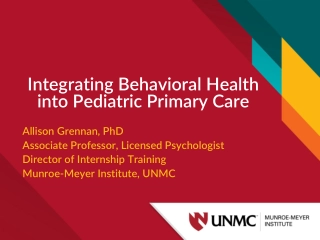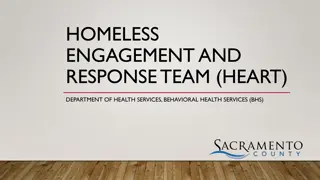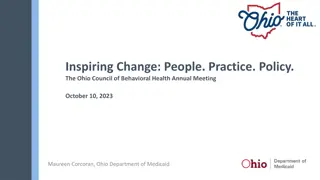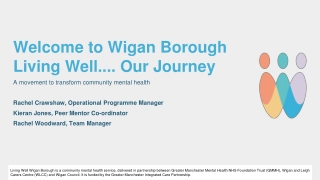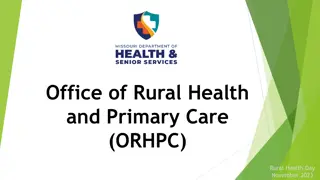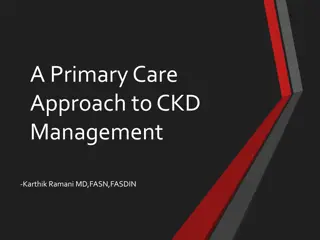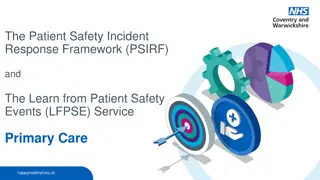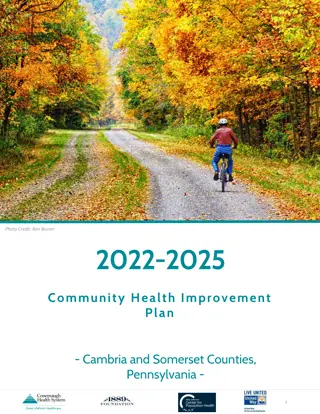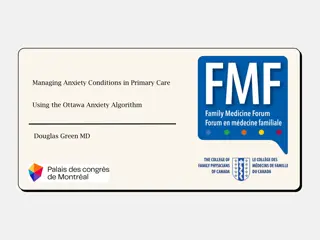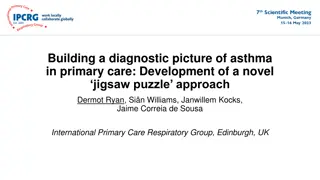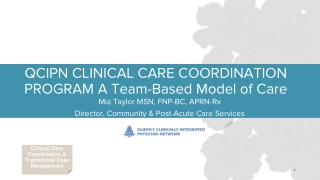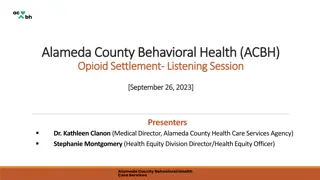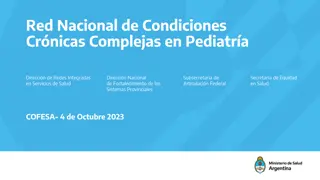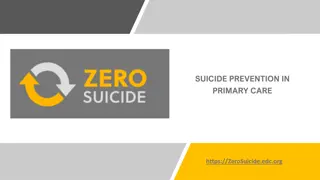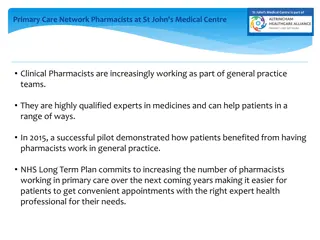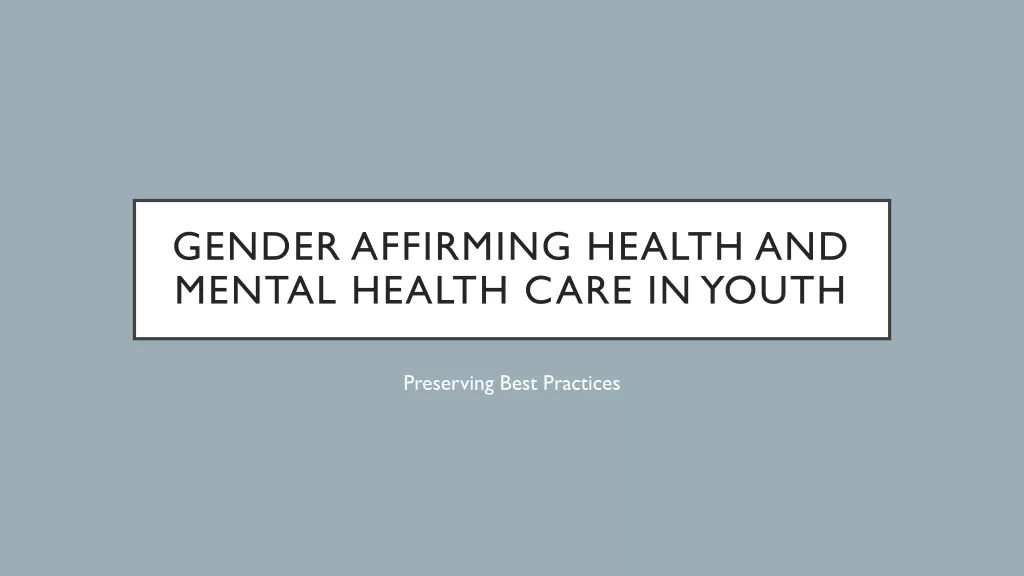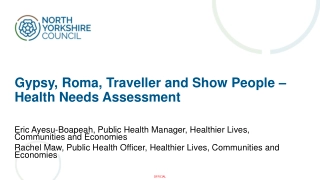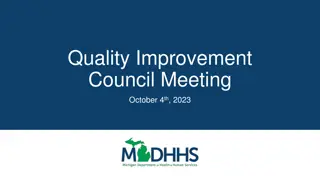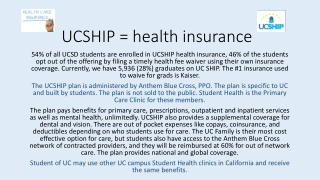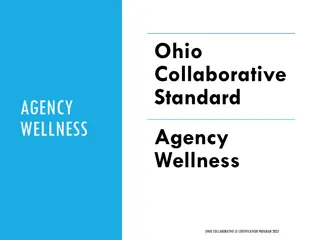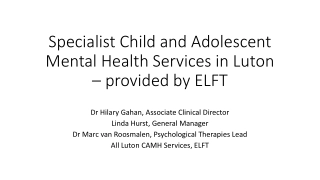Integrating Behavioral Health in Primary Care: Collaborative Care Model (CoCM) Approach
Explore the Collaborative Care Model (CoCM) and Behavioral Health Integration in Primary Care discussed at the North Carolina Community Health Care Association Clinical Conference. Learn about key objectives, roles, billing codes, and resources to promote overall health and reduce treatment gaps and stigma in the field. Understand the significance of whole-person care and the outcomes of integrating behavioral health in primary care settings.
Integrating Behavioral Health in Primary Care: Collaborative Care Model (CoCM) Approach
PowerPoint presentation about 'Integrating Behavioral Health in Primary Care: Collaborative Care Model (CoCM) Approach'. This presentation describes the topic on Explore the Collaborative Care Model (CoCM) and Behavioral Health Integration in Primary Care discussed at the North Carolina Community Health Care Association Clinical Conference. Learn about key objectives, roles, billing codes, and resources to promote overall health and reduce treatment gaps and stigma in the field. Understand the significance of whole-person care and the outcomes of integrating behavioral health in primary care settings.. Download this presentation absolutely free.
Presentation Transcript
Collaborative Care Model (CoCM) and Behavioral Health Integration in Primary Care September 14, 2023 North Carolina Community Health Care Association Clinical Conference on Quality and Chronic Disease Asheville, NC 2
Presenters Nick Ladd, DO Associate Program Director & Child/Adolescent/Adult Psychiatry Faculty, Mountain AHEC Liz Griffin, MSW, LCSW Statewide Behavioral Health Manager, NC AHEC Terri Roberts, MS, PCMH-CCE Statewide Quality Improvement Manager & Senior Practice Support Consultant, NC AHEC/Mountain AHEC 3 3
Agenda Behavioral Health Integration in Primary Care Collaborative Care Model (CoCM) NC AHEC CoCM Scope of Work CoCM Coding/Billing & Financial Model o FQHC CoCM Pro Forma Template NC AHEC CoCM Implementation Gap Analysis/Checklist FQHC CoCM Experience and Lessons Learned Q&A 4 4 4
Objectives At the end of this session, you will be able to: Describe the Collaborative Care Model (CoCM), target population and diagnoses, roles and responsibilities of the CoCM team, use of the data registry and evidenced-based clinical outcomes. Identify the appropriate CoCM billing codes and coverage by payors. Provide information on how FQHCs can use existing CPT codes and utilize a pro forma analysis to assess feasibility of CoCM. Review NC AHEC, AIMS, NC-PAL, NCPA and CCNC CoCM resources. 5
Behavioral Health Integration in Primary Care Liz Griffin, LCSW 6 6
What is Behavioral Health Integration? The Substance Abuse and Mental Health Services Administration (SAMHSA) defines integration as: Whole person care that focuses on overall health; creates partnerships across all aspects of health; and is facilitated by a variety of clinical, structural, and financial arrangements and community supports that remove barriers between physical and behavioral health care. Integrated care is not intended to replace traditional mental health care. 7 7
Behavioral Health Integration in Primary Care Outcomes Promoting Overall Health Closing Treatment Gaps Enhancing Access Reducing Stigma Reducing Risk of Self-harm and Suicide Increasing Positive Patient Outcomes Improving Patient Satisfaction Increasing Physical and Other Clinician satisfaction Promoting Long-Term Value https://www.ama- assn.org/system/files/bhi- compendium.pdf 8 8
Integrated Care Models Primary Care Behavioral Health (PCBH) BH Provider is a generalist BH Provider acts as a consultant Warm handoff and brief intervention Mirrors primary care pace PCP is the primary client Collaborative Care Model (CoCM) Universal screening to identify patients with mild- moderate depression and anxiety (ADHD in peds) Registry driven and Measurement-based treat to target Population-focused Evidence-based intervention/care Over 80 Randomized Controlled Clinical Trials to support the model 10 10
Collaborative Care Model (CoCM) 11 11
Collaborative Care Model (CoCM) Assists Primary Care Clinicians manage patients with mild to moderate behavioral health problems to a point of remission or to a specific treatment target. Patient-Centered Team Care: Patient (Patient Family) Medical Provider/PCP Behavioral Health Care Manager Psychiatric Consultant Registry 12 12
Collaborative Care Model (CoCM): Medical Provider Role Has an established primary treatment relationship Works in close collaboration with the BHCM and PC Prescribes a wide range of therapies and medications Supports treatment plan Champions the model for patients and colleagues Serves as the billing provider https://aims.uw.edu/collaborative-care/team-structure/primary-care-provider-pcp 13 13
Collaborative Care Model (CoCM): BHCM Role Supports treatment plan with Medical Provider Coordinates the overall effort of the group Educates patient about depression/anxiety/ADHD Provides brief behavioral interventions using evidence- based treatment modalities Administers validated rating scales and tracks treatment response in the registry Regularly scheduled (weekly, 1-hr) caseload review meetings with Psychiatric Consultant Communicates resulting treatment recommendations back to the Medical Provider BHCM can be a LCSW(A), LCMHC(A), RN, psychologist or clinician with experience in behavioral health with the target population https://aims.uw.edu/collaborative-care/team-structure/care-manager 14 14
Collaborative Care Model (CoCM): Psychiatric Consultant Role Supports the PCP and BHCM in treating patients Reviews CoCM caseload weekly with the BHCM Suggests treatment modifications for BHCM/PCP to consider Direct communication/contact between the Psychiatric Consultant and the patient is infrequent Can be either a psychiatrist or APP with a psychiatric background, AIMS recommends the Psychiatric Consultant have credentials in the same state as the PCP https://aims.uw.edu/collaborative-care/team-structure/psychiatric-consultant 15 15
Collaborative Care Model (CoCM): Registry Clinical dashboard that tracks response to treatment through regular use of bh measures and allows for stepped care, efficient use of resources and intensifying treatment as needed Supports measurement-based treatments to target https://aims.uw.edu/registry-tools 16 16
Collaborative Care Model (CoCM) Primary Care Provider that serves Medicaid Pediatricians, Family Medicine, FQHCs, RHCs, Internal Medicine, Local Health Departments (those with Primary Care), Behavioral Health Providers Beneficiaries 12+ years of age Mild to Moderate: Anxiety Depression ADHD (peds only) Brief Treatment, Psychiatric Med Management and Treatment to Target Outcomes 18
NC AHEC Support for Collaborative Care Model (CoCM) The goal is to support Advanced Medical Homes (AMH) and Advanced Medical Home Plus (AMH+) in implementing the Collaborative Care Model (CoCM) through: Practice Support at No Cost: NC AHEC Practice Support coaches with expertise in primary care and behavioral health integration will work 1:1 with practices to implement the model based on best practice standards. Coaching on workflows and billing/coding, registry implementation and continuing education programs. Educational Courses: NC AHEC CPD Courses addressing important CoCM topics are provided online to any provider or practice with continuing education credits offered. Courses are conducted in collaboration with AIMS (University of Washington) which is the Center for Excellence in Collaborative Care Model. https://www.ncahec.net/practice-support/collaborative-care 19
NC AHEC Support for Collaborative Care Model (CoCM) Regular virtual peer collaboratives: Monthly collaborativesprovide both a learning and networking opportunity to interested practices with Subject Matter Experts providing the presentation and facilitating discussion. (*coming soon in 2024) Partnership with NC PAL and NC Psychiatric Association for psychiatric consultation for CoCM (both require a contract or MOU with the practice) Outreach to professional organizations (e.g. NASW-NC, NBCC, etc.) and universities for BHCM recruitment Registry Support: NC AHEC Practice Support Coaches will confirm that a practice has necessary components of CoCM in place and make referral to CCNC for use of AIMS CoCM registry (caseload tracker). 20
Alleghany Gates Northampton Warren Surry Rockingham Stokes Person Caswell Hertford Halifax Watauga Wilkes Forsyth Yadkin Orange Franklin Avery Bertie Nash Guilford Caldwell Yancey Edgecombe Davie Tyrrell Madison Iredell Wake Dare Martin Davidson Burke Randolph Chatham Wilson McDowell Buncombe Pitt Catawba Rowan Haywood Hyde Beaufort Johnston Swain Lincoln Lee Rutherford Greene Graham Henderson Cabarrus Harnett Wayne Jackson Stanly Moore Gaston Polk Craven Lenoir Cleveland Macon Cherokee Pamlico Cumberland Clay Jones Richmond Sampson Hoke Union Anson Duplin Cartaret Onslow Robeson Bladen Pender New Hanover Columbus Brunswick (9 21 1/1 5/19/2022.v4
Alleghany Gates Northampton Warren Surry Rockingham Stokes Person Caswell Hertford Halifax Watauga Wilkes Forsyth Yadkin Orange Franklin Avery Bertie Nash Guilford Caldwell Yancey Edgecombe Davie Tyrrell Madison Iredell Wake Dare Martin Davidson Burke Randolph Chatham Wilson McDowell Buncombe Pitt Catawba Rowan Haywood Hyde Beaufort Johnston Swain Lincoln Lee Rutherford Greene Graham Henderson Cabarrus Harnett Wayne Jackson Stanly Moore Gaston Polk Craven Lenoir Cleveland Macon Cherokee Pamlico Cumberland Clay Jones Richmond Sampson Hoke Union Anson Duplin Cartaret Onslow Robeson Bladen Pender New Hanover Columbus Brunswick (9 22 1/1 5/19/2022.v4
Quality & Health Equity Improvement (Medicaid, Medicare QPP/MIPS, All Payors) Medicaid managed care education & issue resolution Clinical workflow redesign & process improvement Behavioral health integration (including Collaborative Care Model) COVID19 vaccine & clinical workflow assistance Practice operational assessments Practice Support Services EHR optimization, telehealth integration HIE training and optimization Revenue cycle management Billing & coding guidance Advanced Medical Home (AMH) tier education and support Tailored Care Management (AMH+/CMA) support Community Health Worker integration and training Social Drivers of Health Workflow & NCCARE 360 Optimization Virtual Collaborative Educational Programming 23 23
CoCM Coding/Billing & Financial Model Terri Roberts, MS, PCMH-CCE 24 24
Coding for Collaborative Care 99492 Initial collaborative care management, first 70 minutes in the first calendar month (Medicaid - $130.64) 99493 Subsequent collaborative care management, first 60 minutes in a subsequent month of behavioral health care manager activities (Medicaid $104.54) 99494 Initial or subsequent collaborative care management, each additional 30 minutes in a calendar month (Medicaid - $54.08) G2214 Initial or subsequent collaborative care management, first 30 minutes in a month of behavioral health care manager activities, in consultation with a psychiatric consultant, and directed by the treating physician or other qualified healthcare professional (Medicaid - $50.93) RHCs and FQHCs are required to bill for care management services using G0512 Coverage for Psychiatric Collaborative Care Management Updated | NC Medicaid (ncdhhs.gov) 25 25
FQHC FQHC CoCM CoCM Pro Forma Template Pro Forma Template Cont d Cont d 28
Other Benefits Potentially improve quality measure scores for targeted population with chronic diseases, transitions of care resulting in improved financial and quality/cost performance with payor contracts, ACO/CINs and shared savings models. Free up appointment access for other types of patients on PCP s schedule with shift of targeted patients to BHCM for behavioral health therapy needs. Reduce PCP and staff burnout with specialized resource to manage behavioral health needs of patients. Enhances local practice brand within community by offering evidence-based integrated behavioral health in primary care setting. Provides greater leverage with payors during contract negotiations by demonstrating ability to provide comprehensive and evidence based services. 29 29
NC AHEC CoCM Implementation Gap Analysis/Checklist 30 30
31 31
Planning for CoCM Leadership Buy-in Physician Champion Patient Analysis Cost Benefit Analysis Determine Solutions: Psychiatry Registry/Tracking Solution Behavioral Health Care Manager Approach CIN for financial support 32 32
FQHC CoCM Experience and Lessons Learned Nick Ladd, DO 33 33
Questions & Answers Reach out to practicesupport@ncahec.net for support with CoCM in your practice! 34 34
Resources Advancing Integrated Mental Health Solutions (AIMS) Center - https://aims.uw.edu/ Agency for Healthcare Research and Quality, The Academy, Integrating Behavioral Health & Primary Care: https://integrationacademy.ahrq.gov/products/behavioral-health-measures-atlas/what-is-ibhc AMA STEPS Forward: https://edhub.ama-assn.org/steps-forward/module/2782794 AMA Behavioral Health Integration in Private Practice: https://www.ama-assn.org/system/files/bhi-private-practice-pediatric-populations.pdf AMA Learn about 4 new CPT codes to bill for collaborative care AMA - https://www.ama-assn.org/system/files/bhi-compendium.pdf American Psychiatric Association - https://www.psychiatry.org/psychiatrists/practice/professional-interests/integrated-care/learn Medicaid Managed Care Webinar Series: Collaborative Care Recording and Slides (April 21, 2022) North Carolina Area Health Education Center (AHEC) Collaborative Care Page: https://www.ncahec.net/practice-support/collaborative-care-2/ North Carolina Psychiatric Access Line: https://ncpal.org/ North Carolina Psychiatric Association - https://www.ncpsychiatry.org/cocm NC Medicaid Coverage for CoCM - https://medicaid.ncdhhs.gov/blog/2022/03/18/coverage-psychiatric-collaborative-care-management- updated SAMHSA-HRSA Center for Integrated Health Solutions - https://www.thenationalcouncil.org/wp- content/uploads/2020/01/CIHS_Framework_Final_charts.pdf?daf=375ateTbd56 35 35


